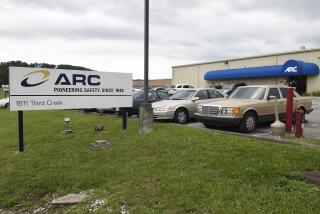14 Deaths Prompt Recall of Heart Valves : Irvine Firm Had Similar Recalls in ‘75, ‘83; 2,700 Already Implanted
- Share via
An Irvine-based medical products firm announced Friday that it is recalling one of its controversial artificial heart valves because of a mechanical defect that already has caused 14 deaths, a company spokesman said.
Officials at Shiley Inc. are asking surgeons not to implant any of its 29-, 31- and 33-milimeter Bjork-Shiley 60-degree Convexo-Concave heart valves manufactured between March and June, 1982, because the struts that hold the valve together could fracture.
“These are only the large-sized valves,” Frank Haskins, Shiley executive vice president, said in a telephone interview Friday night. “Approximately 2,700 have already been implanted worldwide. Probably 200 have not been implanted. We’re asking for those 200 back.”
No Suggestions
Twenty-one of the 2,700 implanted valves have failed, Haskins said, and 14 of the failures have resulted in the patient’s death. Haskins had no suggestions for the 2,700 heart patients who have already had the valves surgically implanted.
“These people have a very low risk of the valves already in them fracturing,” Haskins said. “Usually people with valves work closely with their cardiologists already. They should continue to work with their cardiologists. They should not take any unusual action. I can’t think of anything especially they should do.”
The human heart has four valves that regulate the flow of blood into and out of the organ. These valves sometimes deteriorate or malfunction as a result of birth defects or disease. When this happens, they are replaced with artificial valves.
Such mechanisms consist of a cobalt ring and a pyrolytic carbon disc that is held with a cobalt strut. When operating properly, the strut allows the disk to flip open and shut, causing blood to pass through the heart.
Lost in the Body
When the strut fractures, the disk is lost in the patient’s body, and the heart can no longer pump blood back and forth the way it does in a healthy person, Haskins said. The patient will experience symptoms that resemble congestive heart failure.
“They will become faint-headed and pass out,” he said. “If the person can get to an operating room in time, they can be saved.”
Although this is the third recall of Shiley artificial heart valves since the company opened in 1969, Haskins said, the severity of this particular defect was discovered earlier this week, when a regular analysis showed that “a small number” of the valves could fracture. Similar valves were recalled in 1975 and 1983.
But in 1984, a former Shiley engineer charged that thousands of people have defective artificial heart valves implanted in their chests because of design problems, poor workmanship and lack of training at the company.
‘Safe and Effective’
Haskins denied the charges and said at the time that the valves are “safe and effective.” The valves that were recalled this week were the same valves he staunchly defended last year, he said Friday.
When former engineer George Sherry decried the Shiley valves, officials at the federal Food and Drug Administration said they considered the current models safe. Haskins said Friday that “we’re doing this (recall) in concert with the FDA.”
“We went to the FDA and discussed it with them this week,” he said. However he refused to comment on whether the FDA or his company made the decision to recall the valves. FDA officials could not be reached for comment.
A 46-year-old Santa Monica man filed suit against Shiley Inc. last May, charging that he suffered brain damage when his artificial heart valve broke. Bruce Peterson, a real estate loan agent and the father of a 2-year-old son, is seeking unspecified damages from the company.
Haskins acknowledged that his firm has been sued as a result of the defective valves, but he refused to comment on the litigation.
In the next four or five days company officials will contact every surgeon, cardiologist and hospital administrator in the United States by letter with news of the recall, Haskins said. The company will also notify the governments and valve distributors in foreign countries in an effort to recall defective valves outside the United States.
More to Read
Inside the business of entertainment
The Wide Shot brings you news, analysis and insights on everything from streaming wars to production — and what it all means for the future.
You may occasionally receive promotional content from the Los Angeles Times.











